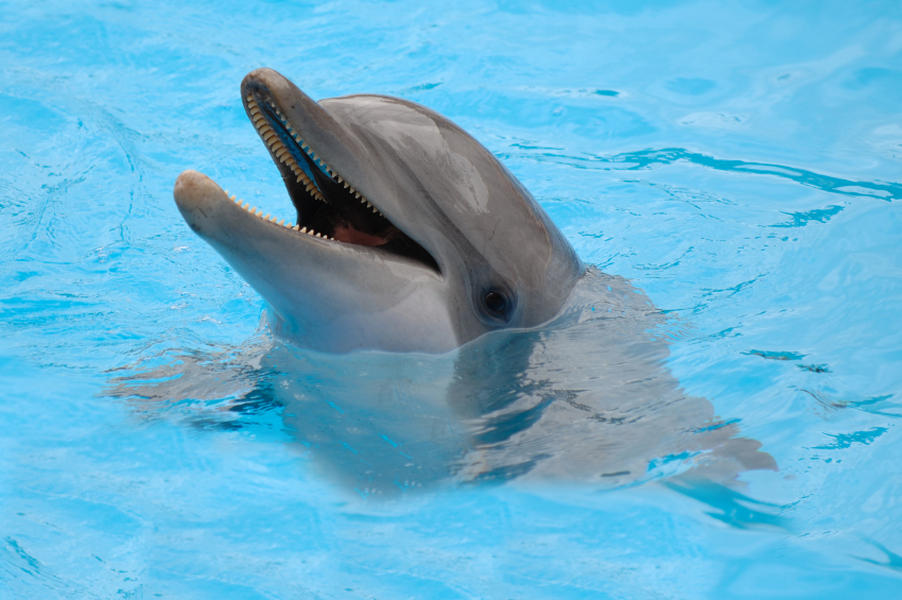Study finds that dolphins may be able to detect magnetic fields


A free daily email with the biggest news stories of the day – and the best features from TheWeek.com
You are now subscribed
Your newsletter sign-up was successful
A new study suggests that dolphins are attracted to magnets and can detect magnetic fields in objects.
Researchers at the University of Rennes 1 and the University Institute of France observed how six bottleneck dolphins responded to both magnetized and demagnetized barrels. The study, published in The Science of Nature, found that dolphins may be magnetosensitive — a.k.a., they can sense Earth's magnetic field.
Dolphins approached the device with shorter latency when it contained a strongly magnetized neodymium block compared to a control demagnetized block that was identical in form and density and therefore undistinguishable with echolocation. We conclude that dolphins are able to discriminate the two stimuli on the basis of their magnetic properties, a prerequisite for magnetoreception-based navigation. [The Science of Nature]
The researchers noted in the study that more research is needed to determine "a more precise and conclusive result" about the study's implications. Dolphins wouldn't be the first animals to align themselves with Earth's magnetic pull, though — previous studies have suggested that dogs align themselves with Earth's magnetic field to poop.
The Week
Escape your echo chamber. Get the facts behind the news, plus analysis from multiple perspectives.

Sign up for The Week's Free Newsletters
From our morning news briefing to a weekly Good News Newsletter, get the best of The Week delivered directly to your inbox.
From our morning news briefing to a weekly Good News Newsletter, get the best of The Week delivered directly to your inbox.
"Dolphins are able to discriminate between objects based on their magnetic properties, which is a prerequisite for magnetoreception-based navigation," Dorothee Kremers, lead author of the study, said in a statement. "Our results provide new, experimentally obtained evidence that cetaceans have a magnetic sense, and should therefore be added to the list of magnetosensitive species."
A free daily email with the biggest news stories of the day – and the best features from TheWeek.com
Meghan DeMaria is a staff writer at TheWeek.com. She has previously worked for USA Today and Marie Claire.
-
 The Week Unwrapped: Have televised confessions quelled protests in Iran?
The Week Unwrapped: Have televised confessions quelled protests in Iran?Podcast Plus, why has Elon Musk turned from Mars to the Moon? And will the BBC prove to be a puzzles champ?
-
 The week’s best photos
The week’s best photosIn Pictures An Andean god, a rogue squirrel, and more
-
 AI surgical tools might be injuring patients
AI surgical tools might be injuring patientsUnder the Radar More than 1,300 AI-assisted medical devices have FDA approval
-
 Blue Origin launches Mars probes in NASA debut
Blue Origin launches Mars probes in NASA debutSpeed Read The New Glenn rocket is carrying small twin spacecraft toward Mars as part of NASA’s Escapade mission
-
 Dinosaurs were thriving before asteroid, study finds
Dinosaurs were thriving before asteroid, study findsSpeed Read The dinosaurs would not have gone extinct if not for the asteroid
-
 SpaceX breaks Starship losing streak in 10th test
SpaceX breaks Starship losing streak in 10th testspeed read The Starship rocket's test flight was largely successful, deploying eight dummy satellites during its hour in space
-
 Rabbits with 'horns' sighted across Colorado
Rabbits with 'horns' sighted across Coloradospeed read These creatures are infected with the 'mostly harmless' Shope papilloma virus
-
 Lithium shows promise in Alzheimer's study
Lithium shows promise in Alzheimer's studySpeed Read Potential new treatments could use small amounts of the common metal
-
 Scientists discover cause of massive sea star die-off
Scientists discover cause of massive sea star die-offSpeed Read A bacteria related to cholera has been found responsible for the deaths of more than 5 billion sea stars
-
 'Thriving' ecosystem found 30,000 feet undersea
'Thriving' ecosystem found 30,000 feet underseaSpeed Read Researchers discovered communities of creatures living in frigid, pitch-black waters under high pressure
-
 New York plans first nuclear plant in 36 years
New York plans first nuclear plant in 36 yearsSpeed Read The plant, to be constructed somewhere in upstate New York, will produce enough energy to power a million homes
